四级写作素材积累:常用词用法解析
必过四级的关键高频词汇全解析
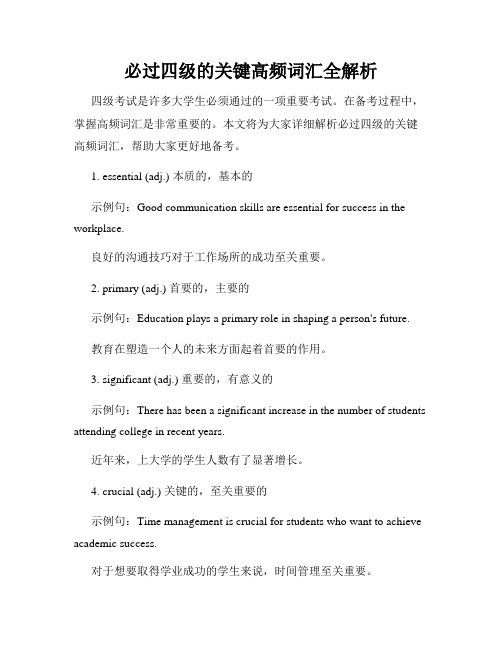
必过四级的关键高频词汇全解析四级考试是许多大学生必须通过的一项重要考试。
在备考过程中,掌握高频词汇是非常重要的。
本文将为大家详细解析必过四级的关键高频词汇,帮助大家更好地备考。
1. essential (adj.) 本质的,基本的示例句:Good communication skills are essential for success in the workplace.良好的沟通技巧对于工作场所的成功至关重要。
2. primary (adj.) 首要的,主要的示例句:Education plays a primary role in shaping a person's future.教育在塑造一个人的未来方面起着首要的作用。
3. significant (adj.) 重要的,有意义的示例句:There has been a significant increase in the number of students attending college in recent years.近年来,上大学的学生人数有了显著增长。
4. crucial (adj.) 关键的,至关重要的示例句:Time management is crucial for students who want to achieve academic success.对于想要取得学业成功的学生来说,时间管理至关重要。
5. extensive (adj.) 广泛的,大量的示例句:She has an extensive knowledge of literature from different time periods.她对不同时期的文学有广泛的了解。
6. acquire (v.) 获得,取得示例句:It takes years of practice to acquire fluency in a foreign language.要获得一门外语的流利运用,需要数年的实践。
四级高频词汇解析必备单词一览

四级高频词汇解析必备单词一览词汇是语言运用的基础,尤其对于英语学习者来说,积累并准确理解高频词汇是提升语言运用能力的关键。
本文将为大家呈现四级高频词汇的一览表,并进行相关解析,旨在帮助读者更好地掌握这些必备单词。
1. abandon词性:动词解析:表示放弃、遗弃或抛弃某人或某事物。
在四级考试中,一般用于描述某人放弃决定、放弃计划、放弃信念等。
例如,"He had to abandon his dream of becoming a musician due to financial difficulties."2. accurate词性:形容词解析:表示准确无误、精确的。
在考试中常用于描述某事物、某数据或某人的行为准确度高。
例如,"The weather forecast turned out to be accurate."3. acknowledge词性:动词解析:表示承认、确认、鸣谢等。
在考试中常用于表达对某个事实、观点或某人的贡献表示认可或感谢。
例如,"We must acknowledge the importance of education in shaping a better future."词性:动词解析:表示获取、获得某物、某技能或某品质等。
在考试中常用于描述某人通过学习、工作等方式获得新的知识或技能。
例如,"She acquired fluency in Spanish after studying abroad for a year."5. adapt词性:动词解析:表示适应、调整某人或某事物以适应新环境、新要求等。
在考试中常用于描述个人或事物对新的变化做出调整。
例如,"We need to adapt our teaching methods to the needs of the students."6. adequate词性:形容词解析:表示足够的、充足的。
四级常见词汇复杂例句及解析
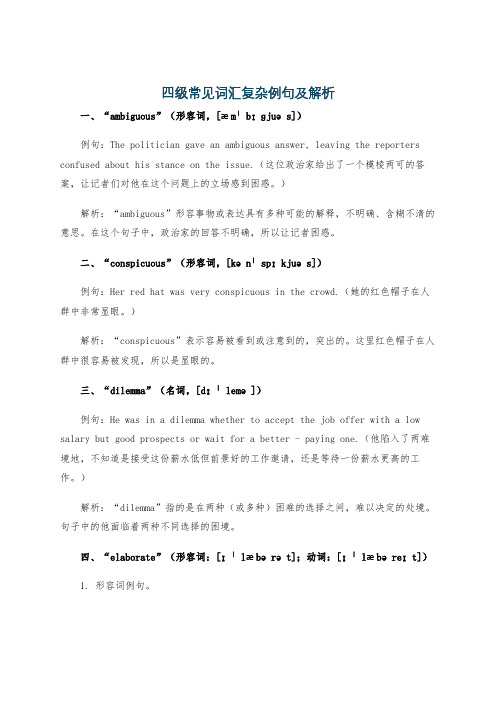
四级常见词汇复杂例句及解析一、“ambiguous”(形容词,[æmˈbɪɡjuəs])例句:The politician gave an ambiguous answer, leaving the reporters confused about his stance on the issue.(这位政治家给出了一个模棱两可的答案,让记者们对他在这个问题上的立场感到困惑。
)解析:“ambiguous”形容事物或表达具有多种可能的解释,不明确、含糊不清的意思。
在这个句子中,政治家的回答不明确,所以让记者困惑。
二、“conspicuous”(形容词,[kənˈspɪkjuəs])例句:Her red hat was very conspicuous in the crowd.(她的红色帽子在人群中非常显眼。
)解析:“conspicuous”表示容易被看到或注意到的,突出的。
这里红色帽子在人群中很容易被发现,所以是显眼的。
三、“dilemma”(名词,[dɪˈlemə])例句:He was in a dilemma whether to accept the job offer with a low salary but good prospects or wait for a better - paying one.(他陷入了两难境地,不知道是接受这份薪水低但前景好的工作邀请,还是等待一份薪水更高的工作。
)解析:“dilemma”指的是在两种(或多种)困难的选择之间,难以决定的处境。
句子中的他面临着两种不同选择的困境。
四、“elaborate”(形容词:[ɪˈlæbərət];动词:[ɪˈlæbəreɪt])1. 形容词例句。
The elaborate design of the palace impressed all the visitors.(宫殿精心的设计给所有游客留下了深刻印象。
英语四级高频词汇及用法

英语四级高频词汇及用法In the quest to excel in the English Level 4 examination, mastering a list of high-frequency vocabulary is essential. These words are the cornerstone of effective communicationand understanding in English. Here, we will explore some ofthe most commonly used words along with their usage to enhance your language proficiency.Abridge - To shorten a text or speech while retaining the essential points. For example, "The editor abridges the novel to make it more accessible to a wider audience."Adhere - To stick or cling to something firmly. It canalso mean to follow rules or principles closely. For instance, "The policy requires all employees to adhere to the safety guidelines."Ameliorate - To make something bad better. It is often used in formal contexts. An example would be, "The new legislation aims to ameliorate the living conditions of the underprivileged."Analyze - To examine something in detail to understand it or draw conclusions. For example, "The scientist analyzes the data to determine the experiment's outcome."Appreciate - To recognize the full worth of something or someone, often followed by a that-clause. For example, "Iappreciate that you've taken the time to help me."Ascertain - To find out or discover something for certain. It is often used in formal writing. For instance, "The detective is trying to ascertain the truth behind the mysterious case."Cater - To provide what is needed or desired, especiallyin terms of food and services. For example, "The restaurant caters to a variety of dietary preferences."Concur - To agree with someone or something. It is aformal way of expressing agreement. For instance, "The committee members concur that the proposal should be accepted."Defer - To postpone or delay something to a later time.It can also mean to yield to someone else's wishes or judgment. An example would be, "The meeting has been deferred until next week."Elicit - To draw out information or a response from someone. It is used in more formal contexts. For example, "The interviewer managed to elicit a detailed account fromthe witness."Exacerbate - To make a problem or bad situation worse. It is commonly used in discussions of issues that are worsening. An example would be, "The heavy rain exacerbated the flooding in the area."Foster - To encourage the development of something, especially something abstract like growth or creativity. For instance, "The program is designed to foster innovation among young entrepreneurs."Hinder - To make it more difficult for something to happen or for someone to do something. For example, "The bad weather hindered our progress on the construction site."Incorporate - To include something as a part of a whole. It is widely used in business and academic contexts. An example would be, "The company's new strategy incorporates environmental sustainability."Justify - To show or prove something to be right or reasonable. For example, "The manager had to justify the budget increase to the board."Mitigate - To make something less severe, serious, or painful. It is often used in the context of problems or consequences. For instance, "The new policy aims to mitigate the impact of climate change."Negotiate - To discuss with someone in order to reach an agreement or compromise. An example would be, "The diplomats are negotiating a peace treaty."Optimize - To make something as effective, efficient, or productive as possible. For example, "The software is designed to optimize the computer's performance."Perpetuate - To keep something, especially something bad, going continuously. For instance, "The outdated traditions perpetuate inequality in the society."Proliferate - To increase rapidly in number. It is often used in the context of things that spread quickly. An example would be, "The rumors proliferated throughout the office."Reiterate - To say something again, especially to make it clear or to emphasize it. For example, "I want to reiteratethe importance of punctuality for this meeting."Substantiate - To provide proof or evidence for a claim. For instance, "The scientist was able to substantiate his theory with experimental results."Undermine - To weaken or damage something, often in a gradual or subtle way. An example would be, "The constant criticism undermined her confidence."Validate - To confirm something as true, accurate, or valid. For example, "The study's findings validate the effectiveness of the new treatment."Volatile - Likely to change rapidly or suddenly, often used to describe markets or substances that can evaporate quickly. For instance, "The stock market can be very volatile, making it risky for investors."By familiarizing yourself with these high-frequency words and their usage, you will not only improve your vocabularybut also enhance your ability to express complex ideas in English. Practice。
英语作文必备词汇四级

英语作文必备词汇四级一、表示开头1. Recently 最近2. Nowadays 现今;当今3. At present 目前;现在二、表示承接1. Firstly 第一;2. Secondly 第二;3. Furthermore ;而且4. Moreover ;再者5. In addition 另外;加之三、表示转折1. However 然而;可是2. Nevertheless 尽管如此;不过3. But 但是4. On the contrary 相反四、表示结论1. In conclusion ;2. To sum up 总而言之3. In a word五、表示原因1. Because 因为2. Due to 由于3. Owing to 因为;由于4. As a result of 由于的结果六、表示结果1. So 所以2. Therefore 因此;所以3. As a result 结果;因此七、表示举例1. For example 例如2. Such as 比如;诸如3. Takefor example 以为例八、表示重要1. Important 重要的2. Crucial 至关重要的3. Vital 重要的;必不可少的4. Essential 必要的;重要的九、表示好处1. Advantage 优点;好处2. Benefit 益处;好处3. Positive effect 积极影响十、表示坏处1. Disadvantage 缺点;不利之处2. drawback 缺点;不利条件3. Negative effect 负面影响十一、表示普遍观点1. It is widely believed that 人们普遍认为2. Most people think that 大多数人认为十二、表示个人观点1. In my opinion 依我之见2. As far as I'm concerned 就我而言3. From my point of view 从我的观点来看希望这些词汇对您的四级英语作文写作有所帮助!。
2019年英语四级写作常用短语及例句word精品文档7页
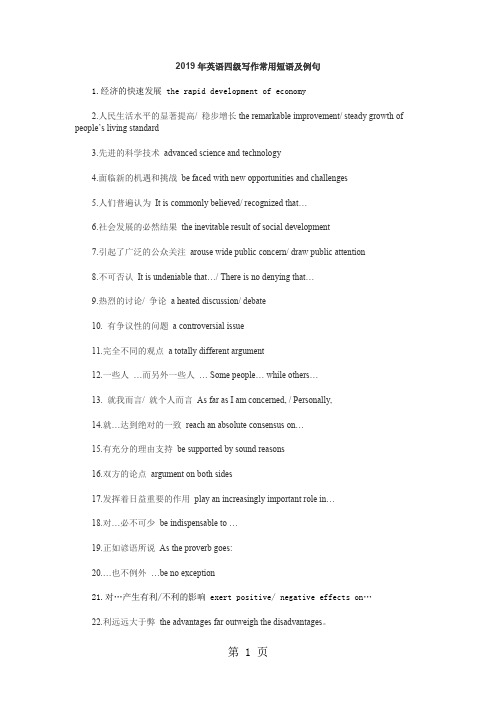
2019年英语四级写作常用短语及例句1.经济的快速发展 the rapid development of economy2.人民生活水平的显著提高/ 稳步增长the remarkable improvement/ steady growth of people’s living standard3.先进的科学技术advanced science and technology4.面临新的机遇和挑战be faced with new opportunities and challenges5.人们普遍认为It is commonly believed/ recognized that…6.社会发展的必然结果the inevitable result of social development7.引起了广泛的公众关注arouse wide public concern/ draw public attention8.不可否认It is undeniable that…/ There is no denying that…9.热烈的讨论/ 争论a heated discussion/ debate10. 有争议性的问题a controversial issue11.完全不同的观点a totally different argument12.一些人…而另外一些人… Some people… while others…13. 就我而言/ 就个人而言As far as I am concerned, / Personally,14.就…达到绝对的一致reach an absolute consensus on…15.有充分的理由支持be supported by sound reasons16.双方的论点argument on both sides17.发挥着日益重要的作用play an increasingly important role in…18.对…必不可少be indispensable to …19.正如谚语所说As the proverb goes:20.…也不例外…be no exception21.对…产生有利/不利的影响exert positive/ negative effects on…22.利远远大于弊the advantages far outweigh the disadvantages。
四级高频词汇的词义辨析与用法考点
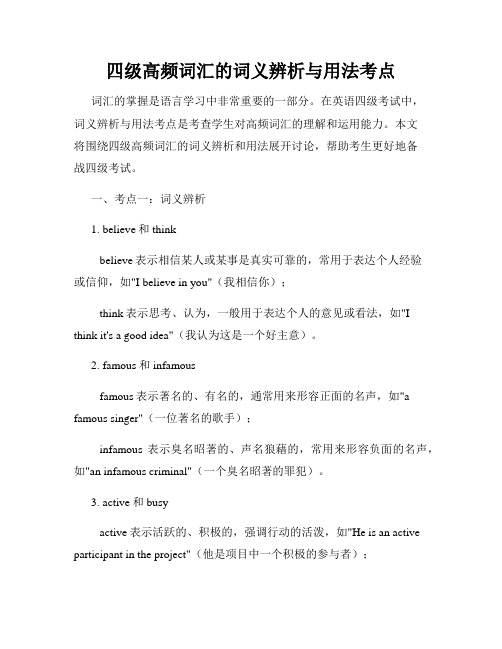
四级高频词汇的词义辨析与用法考点词汇的掌握是语言学习中非常重要的一部分。
在英语四级考试中,词义辨析与用法考点是考查学生对高频词汇的理解和运用能力。
本文将围绕四级高频词汇的词义辨析和用法展开讨论,帮助考生更好地备战四级考试。
一、考点一:词义辨析1. believe和thinkbelieve表示相信某人或某事是真实可靠的,常用于表达个人经验或信仰,如"I believe in you"(我相信你);think表示思考、认为,一般用于表达个人的意见或看法,如"I think it's a good idea"(我认为这是一个好主意)。
2. famous和infamousfamous表示著名的、有名的,通常用来形容正面的名声,如"a famous singer"(一位著名的歌手);infamous表示臭名昭著的、声名狼藉的,常用来形容负面的名声,如"an infamous criminal"(一个臭名昭著的罪犯)。
3. active和busyactive表示活跃的、积极的,强调行动的活泼,如"He is an active participant in the project"(他是项目中一个积极的参与者);busy表示忙碌的、繁忙的,强调时间的安排紧凑,如"She is busy with her work"(她忙于工作)。
二、考点二:用法考查1. 及物动词和不及物动词及物动词要求有宾语的存在,而不及物动词则没有宾语,例如: "I read a book"(我读了一本书)- read是及物动词,后面跟宾语book;"I slept well"(我睡得很好)- sleep是不及物动词,后面没有宾语。
2. 名词单复数单数名词表示一个人或物体,复数名词表示多个人或物体,例如: "a dog"(一只狗)- dog是单数形式;"two dogs"(两只狗)- dogs是复数形式。
英语四级考试常考词汇及例句解析(普特版)
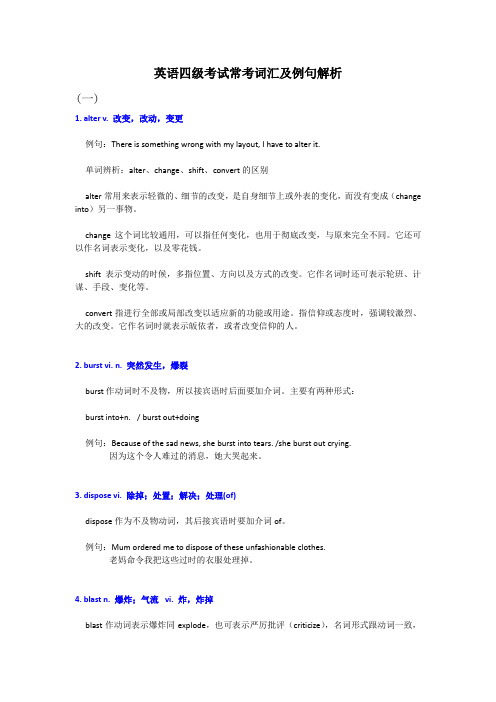
英语四级考试常考词汇及例句解析(一)1. alter v. 改变,改动,变更例句:There is something wrong with my layout, I have to alter it.单词辨析:alter、change、shift、convert的区别alter常用来表示轻微的、细节的改变,是自身细节上或外表的变化,而没有变成(change into)另一事物。
change这个词比较通用,可以指任何变化,也用于彻底改变,与原来完全不同。
它还可以作名词表示变化,以及零花钱。
shift表示变动的时候,多指位置、方向以及方式的改变。
它作名词时还可表示轮班、计谋、手段、变化等。
convert指进行全部或局部改变以适应新的功能或用途。
指信仰或态度时,强调较激烈、大的改变。
它作名词时就表示皈依者,或者改变信仰的人。
2. burst vi. n. 突然发生,爆裂burst作动词时不及物,所以接宾语时后面要加介词。
主要有两种形式:burst into+n. / burst out+doing例句:Because of the sad news, she burst into tears. /she burst out crying.因为这个令人难过的消息,她大哭起来。
3. dispose vi. 除掉;处置;解决;处理(of)dispose作为不及物动词,其后接宾语时要加介词of。
例句:Mum ordered me to dispose of these unfashionable clothes.老妈命令我把这些过时的衣服处理掉。
4. blast n. 爆炸;气流vi. 炸,炸掉blast作动词表示爆炸同explode,也可表示严厉批评(criticize),名词形式跟动词一致,相对应的近义词是explosion,criticism。
例句:Fortunately, no people injured in the blast.幸运的是,爆炸没有造成人员伤亡。
- 1、下载文档前请自行甄别文档内容的完整性,平台不提供额外的编辑、内容补充、找答案等附加服务。
- 2、"仅部分预览"的文档,不可在线预览部分如存在完整性等问题,可反馈申请退款(可完整预览的文档不适用该条件!)。
- 3、如文档侵犯您的权益,请联系客服反馈,我们会尽快为您处理(人工客服工作时间:9:00-18:30)。
英语四级写作素材积累:常用词用法解析1. accelerate: 后面接名词,表示“加速”,中性词,好事坏事都能用。
2. adequate: “足够的”,用来替代经常被使用的enough。
3. advance: 名词,“进步,发展”,用来替代文章开头经常使用的development,progress。
4. advisable / sensible / rational: “合理的”,都可以替代reasonable。
5. cannot afford to: “不应当做”,不是我们说的“负担不起”。
6. be alert to something: “对…保持警惕”,后面接消极概念。
7. alternative: “其他的选择或办法”,比如an alternative is that…就相当于in addition(除此之外)了。
8. applicable / feasible / workable: 都表示“可行的”,用在政策、法令、手段等词前面做修饰语,既可增加字长,又可以提高词汇水平。
9. approach / channel: “方法,手段”,用来替代我们经常使用的一些简单词汇,如method 等等。
10. approve of something: “批准,同意”,注意不要忘记介词of。
11. attach importance to something: 表示“重视,强调”,替代pay attention to。
12. ban / prohibit something: “禁止,杜绝”,表达这个含义时尽量不要使用stop。
13. barrier / obstacle / impediment: “障碍、阻碍”,名词,在写作考试中经常被用到。
14. capital / fund: 解决社会问题时一般都会提到需要投资,可以用到这两个单词,替代money。
Finance 金融financial15. challenging: “困难,有难度”,用来替代difficult。
16. in such circumstances: “在这类情况下”,写作时用于总结某个内容。
17. considerable: “相当大,相当多的”,非常常用的修饰语,比如considerable changes就是相当大的变化。
18. in contrast: “相反”,用来替代我们经常使用的on the contrary,on the other hand。
19. conversely: “相反地”,也可以用来替代on the contrary,on the other hand。
20. copy / repeat one’s experience / success: “借鉴别人的经验,成功经验”。
21. critical: “至关重要的”,用于替代已经被用滥的important。
22. currently: “目前”,用来替代now,nowadays。
23. damage: 作为名词,含义是“损失、损失金额”,动词“损坏”的搭配能力非常强,和表示物品或抽象概念的词都可以放在一起使用,因此可以用来替代destroy。
24. decline: “衰退”,表示数字下降得比较缓慢,在图表作文中根据图表曲线的实际情况使用,替代我们使用的普通单词decrease。
25. defect: “缺点,不足”,用来替代“shortcoming”。
26. demonstrate / illustrate: “说明,表明”,用在图表作文中替代show,reveal等单词。
27. depict / portray: “描述,描绘”,在漫画作文中替代describe。
28. deteriorate: “恶化”,用于替代get bad或get worse。
29. devise: “设计,指定”,后面可以接表示方法手段的内容。
30. discard / abandon: “放弃,抛弃”,用于表达放弃消极想法或做法。
31. dispute: “争端,冲突”,用来替代problem,argument。
32. drop: “下降”,用来替代decrease。
这个词表示下降比较快,如果再用修饰语,应当是sharply,dramatically,drastically。
这三个单词一般都用在消极的单词上。
积极的用greatly。
33. eliminate: “消除”,用于写作与社会消极问题有关的文章。
34. emerge as: “逐渐崛起并成为”,这个词组虽然很短,但是含义非常复杂,可以用在文章的开头,表达某种事物或社会现象从无到有,并迅速传播。
比如Internet has emerged as an indispensable channel for people to exchange information。
35. employ: “采纳,采用”,与表示“观点,方法,政策,法令”等英语单词搭配使用,用来替代adopt。
36. enforce: “执行”法律法规,通常用于作文结束部分,对某个社会问题提出解决办法时使用。
37. essential: “至关重要,核心的”,形容词,用来替代important。
38. It is generally established that: “众所周知,公认”。
39. when the situation is reversed: “相反”,用来替代on the contrary。
40. excessive: “过度的”,这个词在表达消极概念时都可以做修饰语,副词形式excessively,比如tap“开发”,就可以说tap something excessively。
41. exchange: 这个词才是文化,教育等方面的“交流”,而不是communication。
42. expand: “扩大”,后面接影响,范围一类的词汇。
43. facet / factor: “方面,因素”,写作时尽量避免使用element,这个词中国人用得不是很好,aspect因为用的人较多,也可以避免。
44. fail to do: “没有能够”,可以适当替换带有cannot的句子。
45. frequently: “经常”,替代often,表示发生频率很高。
46. fresh / novel: “新的”,比如fresh idea等,都可以用来替代我们经常使用的new。
47. fulfill: “完成,取得”,记住以下词组,fulfill the task, fulfill the dream, fulfill the role。
48. give priority to something: “重视,优先考虑”。
49. give rise to something: “引发,导致…的出现”,积极消极概念都可以使用。
50. given that: “由于…原因”,可以用在句子的开始位置,后面接完整的句子,相当于because。
51. greatly / remarkably: “非常,相当”,作为褒义词,可以用在表示上升、前进、发展等积极含义的单词前面加强程度。
52. guard against: “留心、警惕”,后面使用名词型结构。
53. household: “家庭”,这个词偏重的家庭生活中的设备,物质概念,因此,比如计算机,汽车等设备进入家庭,就应当用enter the household,而不是我们用的home或family。
生活垃圾也可以表达为household wastes。
54. be ignorant about something: “对…没有引起足够重视”,表示没有意识到。
55. incidence: “不良事件”,比如incidence of pollution,incidence of fake commodity等等,表示出现上述不良情况。
56. increasingly: “越来越”,副词,可以用在动词和形容词前面,加深程度。
57. indispensable: “不可缺少的,必须的”,写作时可以用来做很多名词的修饰语。
58. individualistic / selfish / self-centered: 都是“自私的”含义,可以交替使用。
59. inspire / stimulate: “鼓励”,替代encourage。
60. for instance: “例如”,虽然这个词组我们经常见到,但很少有人在写作文时用它来替代for example。
61. instruct: “教育”,名词形式为instruction,同educate,education交替使用。
62. intend to do: “计划,打算”,可以替代be going to等词组,表达做事的意愿。
63. make investment into: “投资,投入”,投资是解决社会问题的一个核心方式,因此这个词组在英语写作中经常会用到。
64. issue: “问题”,中性词,我们平常使用的problem是贬义词,因此比如网络问题等词组都应当用issue来表达。
65. launch a campaign to do something: “大力开展…活动”。
66. maintain: “一贯认为,坚持认为”,一般写成somebody maintains that,后面使用完整的句子,用来替代think, believe。
67. major: “主要的”,用来替代main。
68. major / primary concern: “主要关注点”,名词,要说something is somebody’s major concern。
69. misleading: “误导的,错误的”,替代wrong。
70. observe: “遵守”,后面接名词,如法律法规等。
71. be out of / be short of: “耗尽”/“短缺”,用来替代lack,同时提醒大家lack这个词的动词形式在英语中使用的很少。
72. outlook: “前景,未来”,用来替代future。
当然,如果用future,就可以加个修饰语,比如foreseeable future等等。
73. plummet / slump: “急剧下降”,图表作文中使用较多。
74. popularize: “推广,普及”,很常用的单词,后面接知识,道理,方法,法律法规等各种词汇。
75. possess: “拥有”,用于替代have,既可以表示拥有具体事物,也可以说拥有抽象品质,特征。
76. poverty-stricken: “贫困的,低收入的”,替代poor。
